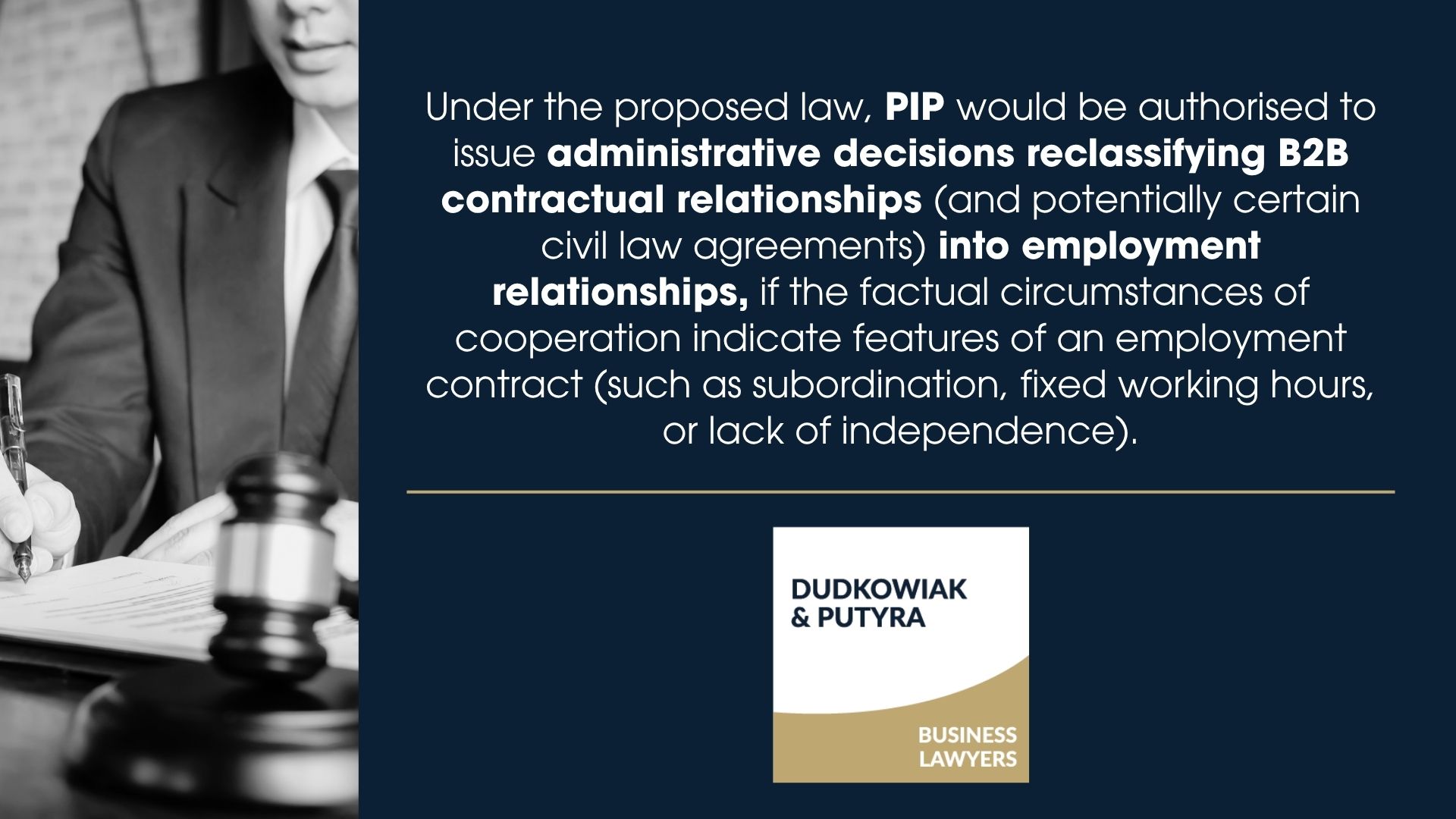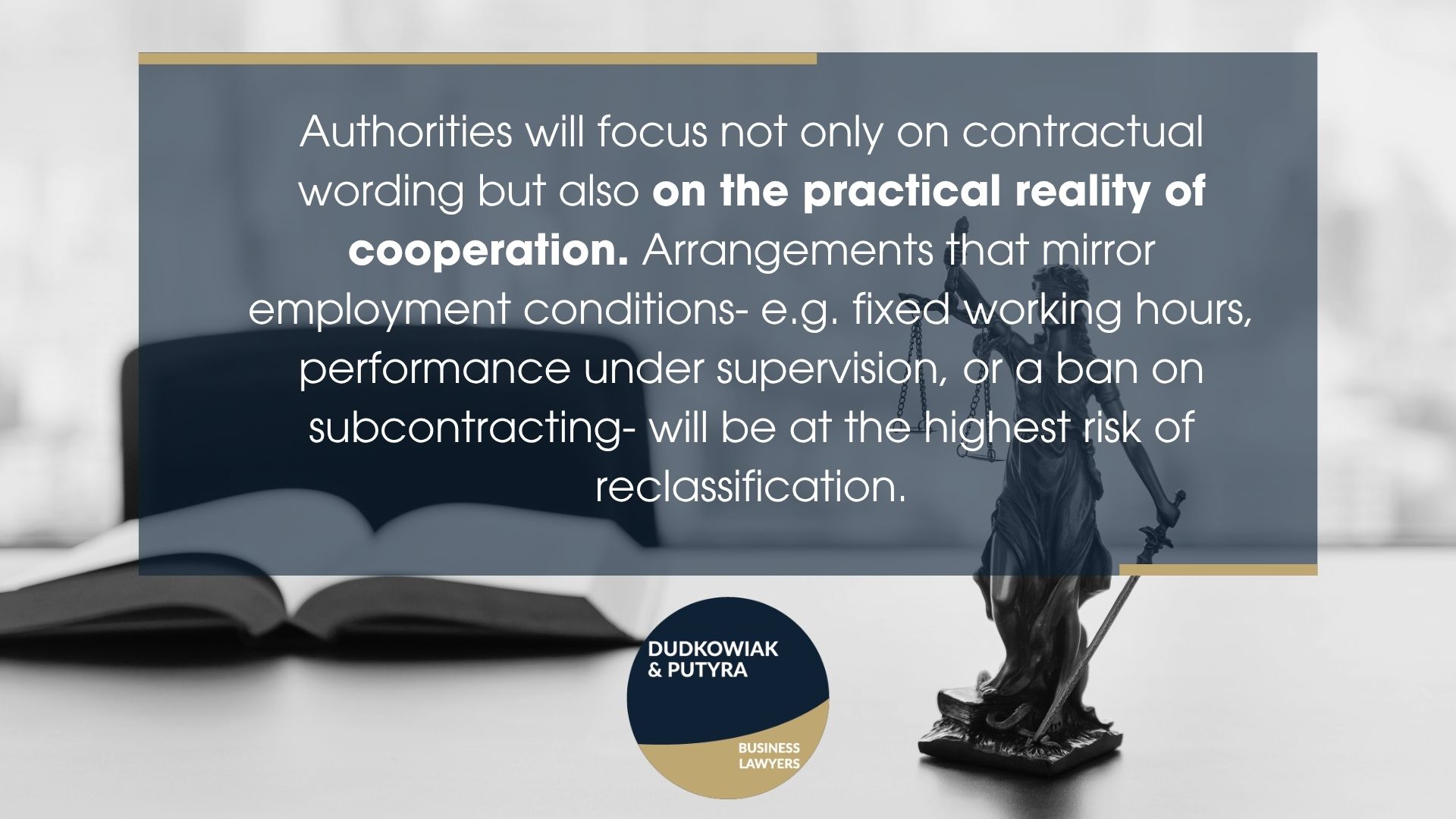Upcoming Legislative Changes: State Labour Inspectorate (PIP) with the authority to change B2B contracts into employment
What is the legal context?
The Polish legislator is currently processing a draft bill that would significantly expand the powers of the State Labour Inspectorate (Państwowa Inspekcja Pracy, “PIP”).
Under the proposed law, PIP would be authorised to issue administrative decisions reclassifying B2B contractual relationships (and potentially certain civil law agreements) into employment relationships, if the factual circumstances of cooperation indicate features of an employment contract (such as subordination, fixed working hours, or lack of independence).

These decisions:
- would be immediately enforceable,
- could only be challenged within a 7-day period, and
- would generate instantaneous legal and financial consequences for both parties.
Importantly, this proposal has already drawn significant criticism from business organisations, and its final shape may be subject to amendments. Nevertheless, if enacted in its current form, the reform will fundamentally change the risk landscape for Polish employers relying on B2B contractors.
What will be the consequences for employers?
If a B2B contract is reclassified by PIP as an employment relationship, the following obligations may arise:
- Employers may be required to recalculate and pay entitlements such as holiday leave, overtime, and other employment benefits for up to 3 years retrospectively.
The reclassified employer will need to:
- pay arrears in social security (ZUS) and health insurance contributions,
- settle unpaid advances on Personal Income Tax (PIT),
- adjust VAT settlements (loss of input VAT deductions for invoices previously issued by the contractor).
Even if an employer successfully challenges PIP’s decision in court, the payments must be made upfront and only later reclaimed.
What will be the consequences for B2B contractors?
For contractors, reclassification carries equally serious implications:
- Loss of contractual flexibility, including remote work arrangements and autonomy in task performance.
- Tax consequences: Contractors may be obliged to recalculate PIT under the employee tax scale, losing access to more advantageous forms of business taxation (e.g. flat tax, lump-sum).
- Denial of business expenses: Contractors may lose the right to deduct costs linked to their business activity.
What is the scope of the proposed reform?
The proposed changes could apply to all new B2B contracts but also to the existing contracts already in force.
Authorities will focus not only on contractual wording but also on the practical reality of cooperation. Arrangements that mirror employment conditions- e.g. fixed working hours, performance under supervision, or a ban on subcontracting- will be at the highest risk of reclassification.

How to prepare for regulatory changes? Key actions
We recommend that businesses operating in Poland proactively prepare for the upcoming changes:
Review contracts:
- Audit all B2B and civil law contracts.
- Identify contracts at risk due to “employment-like” features.
Amend contractual documentation:
- Introduce flexible, task-oriented terms.
- Avoid provisions mirroring employment (fixed hours, mandatory place of work, direct supervision, rigid leave or break rules).
- Ensure contracts emphasise contractor independence and business risk.
Assess practical cooperation:
- Verify whether contractors and employees perform work under similar conditions (same office hours, same reporting duties, same tools).
- Align practical reality with contractual terms- PIP will look beyond the paperwork.
Develop a compliance policy:
- Establish a written business justification for the use of B2B contracting.
- Clearly differentiate the rationale behind employment and contracting models.
Prepare legal safeguards:
- Given the 7-day appeal deadline, companies must be prepared to act swiftly if PIP issues a decision.
- Have arguments, documentation, and a litigation strategy ready in advance.
How can Dudkowiak & Putyra help you prepare for the new regulations?
Our Employment Team at Dudkowiak & Putyra offers tailored support at every stage of this process.
We help businesses review and adapt contracts, assess practical cooperation models, and prepare strategies for inspections and potential litigation. With our experience, you can approach the upcoming changes with confidence and minimize legal risks.
The proposed legislation represents a systemic shift in the regulation of the Polish labour market. If adopted, it will substantially limit the use of B2B contracting as a flexible alternative to employment.
Businesses should not wait for the final adoption of the law. Immediate preparation- through contract reviews, internal policies, and compliance frameworks- will be crucial to mitigate risks and ensure readiness for potential inspections.
Don’t wait- contact our team of experts!


